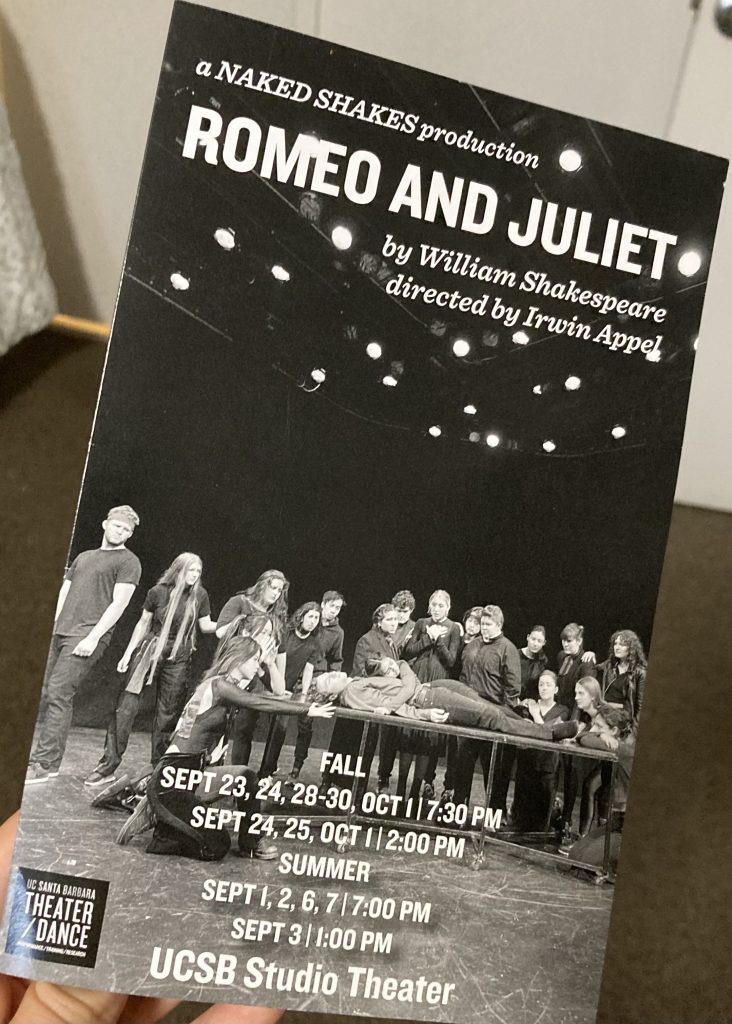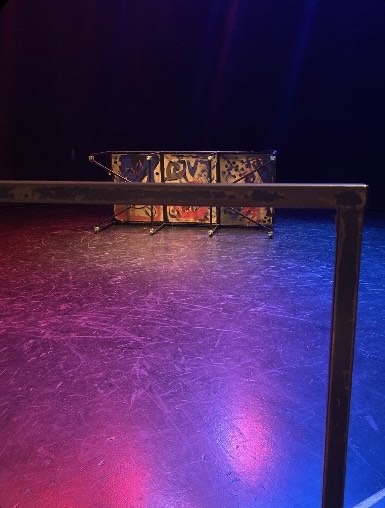Cassandra Pataky
Senior Staff Writer
Naked Shakes is a Shakespearean theater production company that uses minimal costuming and sets, leaving the audience to focus on the actors’ performance and the language of Shakespeare. Before the Shakespearean language intimidates you, the company also attempts to modernize Shakespeare in an effort to bring it to the contemporary audience — you!
This past summer, Naked Shakes performed their rendition of Romeo and Juliet, directed by Professor Irwin Appel. It sold out over the summer and, due to popular demand, was brought back for the beginning of fall quarter, from Sept. 23 – Oct. 1 in the UC Santa Barbara (UCSB) Studio Theater. As one of the lucky ones who attended a performance, I thought the Naked Shakes production effectively modernized Romeo and Juliet in a way that made it accessible to unfamiliar audiences.
Appel’s production proved digestible for those who don’t read Shakespeare. One way this was instated was through the use of hand gestures. Mercutio, in his monologue about dreams and Queen Mab, starts to act out part of what he is saying — making circular motions with his hands to demonstrate the wheels of Queen Mab’s wagon. I often find myself losing focus when a Shakespearean character begins a long monologue, so the physical actions of the Naked Shakes’ characters helped me regain focus and understand what was missed. Another example is that instead of biting their thumbs at each other — an insult from Shakespeare’s time — the characters flip each other off, conveying the same meaning in a contemporary form audiences would understand (and arguably enjoy more).
Shakespeare is also known to have a lot of dirty jokes in his plays. Because of the older language, however, I usually do not understand them as I simply try to keep up with the intricate plotline. In the Naked Shakes production, however, some of the characters used phallic gestures to further convey the meaning of their dialogue. This helped the audience understand that a scene was not a formal interaction between the characters, but a group of friends poking fun at each other. This also characterized Romeo, Benvolio, and Mercutio further as good friends. In many other interpretations and productions, the interactions between the aforementioned trio can seem stilted and formal, and the three friends don’t seem so close.
As one who enjoys romance in conjunction with other plotlines, this additional characterization was a welcome respite from the dramatic relationship between Romeo and Juliet. This brings to mind another aspect of the play that I enjoyed — the emphasis on the Montague-Capulet dispute, shown primarily through costuming and lighting. The cast was dressed almost entirely in black, but each member had a stripe of color — blue for Montagues, red for Capulets, and a few yellow for the Prince of Verona and his kinsmen — that labeled their allegiance. In addition, before the play began, the lighting on stage was split, with half of it in blue and the other half in red. In much of pop culture’s understanding of Romeo and Juliet, the romance between the two lovers is the focus, and their feuding families are merely mentioned as the reason why Romeo and Juliet cannot be together. However, this is not the case, and having this additional dynamic present proved entertaining.

There was not much about the performance that I did not like. I will say the production was a little long at just over two hours, or at least I would advise the readers to get up and move around during the intermission (something I regretfully did not do). There were also times when the production became overbearing in its sensory nature, mostly in the initial fight scenes. This was a good way to start the play, because it engaged the audience right away, but the clanging metal and booming voices were loud enough for me to twitch uncomfortably a few times.
Despite this temporary sensory discomfort, I thoroughly enjoyed Irwin Appel’s production of Romeo and Juliet and do not regret spending $14 and 2 hours watching it. I thought this production excelled in bringing Shakespeare to an audience unfamiliar with his work in a straightforward and digestible way. It makes sense why the program was brought back for the fall. Unfortunately, the program has run its course, and, to my knowledge, will not be presented again. However, for anyone who missed the Naked Shakes production of Romeo and Juliet, you now know the talents of Irwin Appel and his transformation of Shakespeare’s classics, and I highly recommend attending the next Naked Shakes production.











